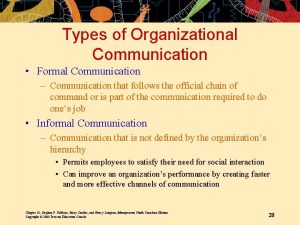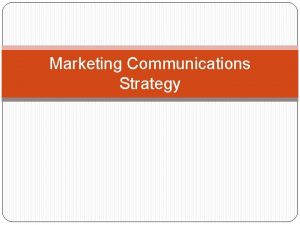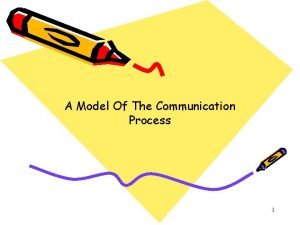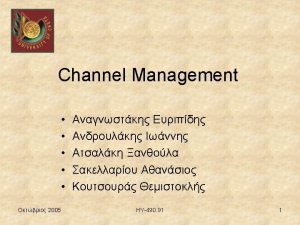UNIVERSAL PEACE FEDERATION Couple Communication Opening the Channels




















- Slides: 20

UNIVERSAL PEACE FEDERATION Couple Communication Opening the Channels of Understanding UPF Marriage and Family Series

Couple Communication: Opening the Channels of Understanding

“The purpose of marriage is to synchronize the man’s heart and the woman’s heart to perfect their love. The wedding ceremony is a proclamation of the couple’s commitment and determination toward that goal. If you start with the goal to perfect your love and heart through your married life, you are on the way to fulfilling the ideal of family. If you actually fulfill it, upon your death you will certainly go to heaven, because your lives will be heaven. ” Father Moon

“It is easier to be a president of a whole nation than to be a husband or wife. ” Father Moon

Conflict is Natural All relationships of any depth have conflict Close relationships require closeness and oneness of “Us” but also individuality and autonomy of “Me”. Happy couples have 10 - 15 irreconcilable differences

Why Do All Couples have Conflict? Different background Different personalities Gender differences

Gender Differences: Background, Socialization, Stereotypes

Our brains are different , we think, emote and perceive differently

Perfecting Our Love: Openness to Understanding • What matters is learning to deal with the conflicts and differences constructively • The key is understanding the other’s perspective

Give Common Poor Listening Responses to: “This house is a mess and I just cleaned it!” “My co-workers are all slacking off. I am so frustrated by the morale at work. ” “I am worried that Sarah will never forgive me for talking behind her back. ” “I have been trying to lose weight and I just gained a pound!!! “ “I am so tired of my boss yelling at me, it makes me want to quit. ”

Effective Listen is not easy

Ineffective Listening, even with good intentions Tends to: • Minimize or deny the speaker’s feeling • Give advice, fix the problem prematurely • Turn attention to self, own emotional reaction • Agree just to be liked or thoughtless, careless Results in : Not build connection or depth of understanding, often does not convey the listener cares

Effective Listening Results Interpersonal- Builds connection, understanding, acceptance, emotional safety Intrapersonal - Allows space for thinking through one’s emotions, perspective, clarity for deciding how to problem solve, and understand oneself

Empathy: At the Heart of Good Relationships http: //www. youtube. com/watch? v=zsk. Ya. HAz. Kfs Dr. Leslie Parrott

How to give Reflective Listening 1. Decide to listen to their heart and situation, “Turn off your brain” - don’t solve, agree or disagree, fix, deny or comfort 2. Practice basic paraphrase formula: a. “It seems like” or “sounds like” or “I guess…” b. “you feel or are ______ “ (label emotion: hurt, angry, frustrated, disappointed, excited, etc. ) c. “when ______. ” (specific situation, event or behavior, not interpretation of motive)

What could you say to reflect and build understanding? • Your child says kids made fun of his class presentation. • Your says her friend seems mad at her for not visiting when she was sick. • Your friend says he anticipates getting laid off. • Your spouse says he got a poor job review today. • Your spouse says he has to cancel his whole program because of the bad weather.

Demonstration and Practice

Daily Spiritual Practice of Reflective Listening

Other Good Relationship Practices Self-reflection, self-evaluation Expressing negative feelings, without blame or damaging relationship Asserting one’s needs, making constructive, specific requests Negotiating differences and problem solving Make and Spend time 1. building positives, replenishing the fun, friendship and passion, 2. regular but separate time to deal with business and issues

Keep Practicing
 Interreligious and international federation for world peace
Interreligious and international federation for world peace Horizontal communication
Horizontal communication Promotions mix
Promotions mix Keep the communication channel open
Keep the communication channel open Organizational communication formal and informal
Organizational communication formal and informal Youtube
Youtube A contest differs from a sweepstakes in that ______.
A contest differs from a sweepstakes in that ______. Communication channels used in sales promotion
Communication channels used in sales promotion Establishing a framework for business communication
Establishing a framework for business communication Universal ingredients of human communication
Universal ingredients of human communication Universal serial interface
Universal serial interface Universal of interpersonal communication
Universal of interpersonal communication Hình ảnh bộ gõ cơ thể búng tay
Hình ảnh bộ gõ cơ thể búng tay Lp html
Lp html Bổ thể
Bổ thể Tỉ lệ cơ thể trẻ em
Tỉ lệ cơ thể trẻ em Gấu đi như thế nào
Gấu đi như thế nào Tư thế worms-breton
Tư thế worms-breton Bài hát chúa yêu trần thế alleluia
Bài hát chúa yêu trần thế alleluia Kể tên các môn thể thao
Kể tên các môn thể thao Thế nào là hệ số cao nhất
Thế nào là hệ số cao nhất







































